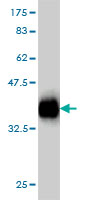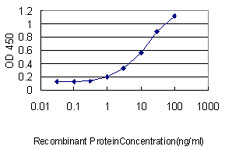TMEPAI Antibody (monoclonal) (M01)
Mouse monoclonal antibody raised against a partial recombinant TMEPAI.
- SPECIFICATION
- CITATIONS
- PROTOCOLS
- BACKGROUND

Application
| WB, E |
|---|---|
| Primary Accession | Q969W9 |
| Other Accession | BC015918 |
| Reactivity | Human |
| Host | mouse |
| Clonality | Monoclonal |
| Isotype | IgG2a Kappa |
| Clone Names | 2A12 |
| Calculated MW | 31609 Da |
| Gene ID | 56937 |
|---|---|
| Other Names | Protein TMEPAI, Prostate transmembrane protein androgen induced 1, Solid tumor-associated 1 protein, Transmembrane prostate androgen-induced protein, PMEPA1, STAG1, TMEPAI |
| Target/Specificity | TMEPAI (AAH15918, 181 a.a. ~ 280 a.a) partial recombinant protein with GST tag. MW of the GST tag alone is 26 KDa. |
| Dilution | WB~~1:500~1000 |
| Format | Clear, colorless solution in phosphate buffered saline, pH 7.2 . |
| Storage | Store at -20°C or lower. Aliquot to avoid repeated freezing and thawing. |
| Precautions | TMEPAI Antibody (monoclonal) (M01) is for research use only and not for use in diagnostic or therapeutic procedures. |

Thousands of laboratories across the world have published research that depended on the performance of antibodies from Abcepta to advance their research. Check out links to articles that cite our products in major peer-reviewed journals, organized by research category.
info@abcepta.com, and receive a free "I Love Antibodies" mug.
Provided below are standard protocols that you may find useful for product applications.
References
1.Mutation or Loss of p53 Differentially Modifies TGFβ Action in Ovarian CancerO Hainmhire E, Quartuccio SM, Cheng W, Ahmed RA, King SM, Burdette JEPLoS One. 2014 Feb 20;9(2):e89553. doi: 10.1371/journal.pone.0089553. eCollection 2014.2.TMEPAI regulates EMT in lung cancer cells by modulating the ROS and IRS-1 signaling pathways.Hu Y, He K, Wang D, Yuan X, Liu Y, Ji H, Song JCarcinogenesis. 2013 Apr 24.3.Identification of two distinct carcinoma-associated fibroblast subtypes with differential tumor-promoting abilities in oral squamous cell carcinoma.Costea DE, Hills A, Osman AH, Thurlow J, Kalna G, Huang X, Pena Murillo C, Parajuli H, Suliman S, Keerthi KK, Johannessen AC, Partridge MCancer Res. 2013 Apr 18.4.Transforming Growth Factor-{beta} (TGF-{beta})-Inducible Gene TMEPAI Converts TGF-{beta} from a Tumor Suppressor to a Tumor Promoter in Breast Cancer.Singha PK, Yeh IT, Venkatachalam MA, Saikumar P.Cancer Res. 2010 Jul 7. [Epub ahead of print]5.TMEPAI, a Transmembrane TGF-beta-Inducible Protein, Sequesters Smad Proteins from Active Participation in TGF-beta Signaling.Watanabe Y, Itoh S, Goto T, Ohnishi E, Inamitsu M, Itoh F, Satoh K, Wiercinska E, Yang W, Shi L, Tanaka A, Nakano N, Mommaas AM, Shibuya H, Ten Dijke P, Kato M.Mol Cell. 2010 Jan 15;37(1):123-34.6.A feedback loop between the androgen receptor and a NEDD4 binding protein, PMEPA1 in prostate cancer cells.Li H, Xu LL, Masuda K, Raymundo E, McLeod DG, Dobi A, Srivastava S.J Biol Chem. 2008 Oct 24;283(43):28988-95. Epub 2008 Aug 14.7.High level expression of STAG1/PMEPA1 in an androgen-independent prostate cancer PC3 subclone.Hirokawa YS, Takagi A, Uchida K, Kozuka Y, Yoneda M, Watanabe M, Shiraishi T.Cell Mol Biol Lett. 2007 Feb 17; [Epub ahead of print]
If you have used an Abcepta product and would like to share how it has performed, please click on the "Submit Review" button and provide the requested information. Our staff will examine and post your review and contact you if needed.
If you have any additional inquiries please email technical services at tech@abcepta.com.













 Foundational characteristics of cancer include proliferation, angiogenesis, migration, evasion of apoptosis, and cellular immortality. Find key markers for these cellular processes and antibodies to detect them.
Foundational characteristics of cancer include proliferation, angiogenesis, migration, evasion of apoptosis, and cellular immortality. Find key markers for these cellular processes and antibodies to detect them. The SUMOplot™ Analysis Program predicts and scores sumoylation sites in your protein. SUMOylation is a post-translational modification involved in various cellular processes, such as nuclear-cytosolic transport, transcriptional regulation, apoptosis, protein stability, response to stress, and progression through the cell cycle.
The SUMOplot™ Analysis Program predicts and scores sumoylation sites in your protein. SUMOylation is a post-translational modification involved in various cellular processes, such as nuclear-cytosolic transport, transcriptional regulation, apoptosis, protein stability, response to stress, and progression through the cell cycle. The Autophagy Receptor Motif Plotter predicts and scores autophagy receptor binding sites in your protein. Identifying proteins connected to this pathway is critical to understanding the role of autophagy in physiological as well as pathological processes such as development, differentiation, neurodegenerative diseases, stress, infection, and cancer.
The Autophagy Receptor Motif Plotter predicts and scores autophagy receptor binding sites in your protein. Identifying proteins connected to this pathway is critical to understanding the role of autophagy in physiological as well as pathological processes such as development, differentiation, neurodegenerative diseases, stress, infection, and cancer.



